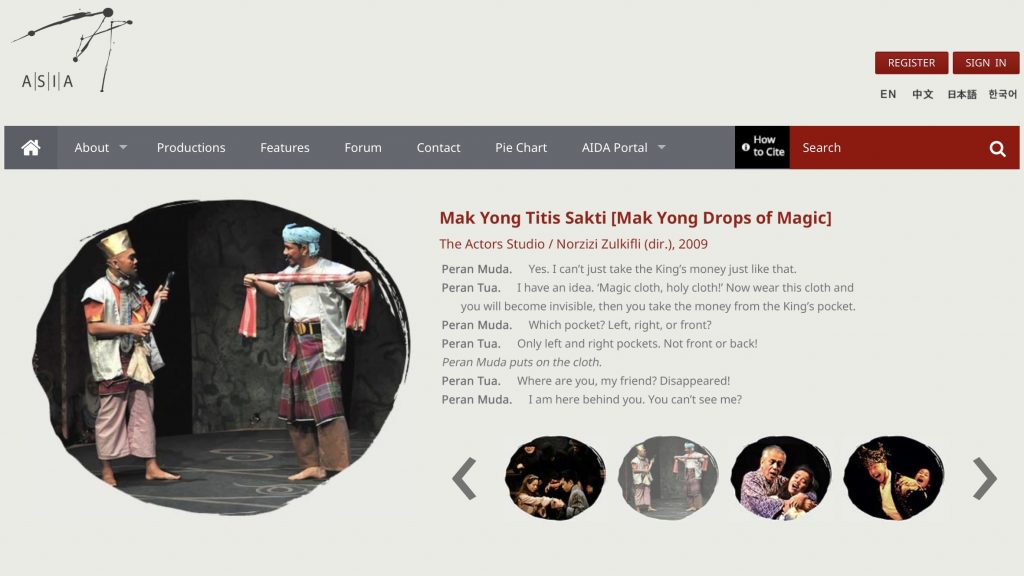Bringing Shakespeare in Asia to the World
October 6, 2021
IN BRIEF | 4 min read
-
NUS Department of English Language & Literature Associate Professor Yong Li Lan, who was also co-chair of the WSC Local Organising Committee, leveraged the Asian Shakespeare Intercultural Archive (A|S|I|A) to enhance the 11th World Shakespeare Congress programme significantly, highlighting the value of digital archives in the new normal of virtual events/conferences, home-based learning, and work-from-home arrangements.

When the 11th World Shakespeare Congress (WSC) had to move online due to the COVID-19 pandemic, NUS Department of English Language & Literature Associate Professor Yong Li Lan, who was also co-chair of the WSC Local Organising Committee, immediately saw the potential in using the Asian Shakespeare Intercultural Archive (A|S|I|A) to enhance the WSC programme.
An invaluable resource: The Asian Shakespeare Intercultural Archive
A|S|I|A is a publicly accessible online archive of Shakespeare performance materials from East and Southeast Asia, based in the NUS Faculty of Arts and Social Sciences. Led by Assoc Prof Yong since the project started in 2008, A|S|I|A has won three successive research grants from MOE to contribute to Singapore’s dynamic role as a bridge between cultures. The archive is intended for scholars, practitioners, teachers, students, and general audiences. It currently contains over 60 Asian Shakespeare productions in 17 languages, and the archived productions include full-length video-recordings of performances, original scripts, programmes, and publicity materials donated by theatre companies. The A|S|I|A partners conceive the archive as a model of intercultural knowledge that brings together several areas: Theatre Studies, Comparative Asian Studies, Shakespeare Performance, Translation and Digital Humanities. It is a multinational project involving a team of over 60 scholars, translators, theatre practitioners, designers, and programmers around the world, including undergraduate and graduate students mostly from the Department.

Beyond its archival and research roles, A|S|I|A also functions as a teaching resource, and it is used in university courses in Singapore, Malaysia, Philippines, Japan, Taiwan, South Korea, the United States, the United Kingdom and Canada. All production scripts are translated into English, Chinese, Japanese, and Korean, and there is extensive data on the productions such as its creators, dates and venues; art/forms, languages and staging; receptions and reviews; and historical and cultural references.

Assoc Prof Yong uses the archive in her “Shakespeare and Asian Performances” module as the primary resource for teaching materials, as well as the medium, method and ethos of relating to Asian Shakespeare performances.
“The collection of 62 performance recordings in A|S|I|A, simply by being assembled and translated, can be compared in detail in ways that a live spectator travelling between the performance locations could not accomplish,” she shared.
All the world’s a digital stage: staging the first Digital Asian Shakespeare Festival
The opportunity to share this wealth of resources came in July 2021, at the first ever online WSC. Often likened to the Olympics of Shakespeare studies, WSC events feature numerous theatrical performances, keynotes, roundtables, panels and seminars, so being reduced to a series of typical Zoom sessions would have resulted in a poorer event.
Assoc Prof Yong, together with Dr Alvin Lim and Dr Eleine Ng, were able to utilise A|S|I|A’s productions, networks, and copyright permissions to screen Asian Shakespeare performances, enabling the WSC to hold its first ever Digital Asian Shakespeare Festival.

WSC delegates were treated to 10 performances, mostly drawn from A|S|I|A, by renowned and emerging directors in East, South and Southeast Asia. The organisers also brought in the directors of the screened performances to hold interactive watch parties, where a director used curated clips from their performance to speak about their creative concept and process in adapting Shakespeare. If physical performances had been staged in Singapore, there could not have been as many performances, nor would it have been possible to hold such interactive sessions with the directors.
The festival and its watch parties proved to be a hit at the 2021 WSC, providing a special opportunity to understand how and why Asian practitioners bring Shakespeare onto their own stages. Delegates commented that this was a rare privilege and an original feature in this WSC.

This successful use of A|S|I|A highlights the increasing value of digital archives in the new normal of virtual events/conferences, home-based learning, and work-from-home arrangements.
“Our experience in A|S|I|A with working digitally to present performances online and above all our relationships with directors could be turned in a new direction. As the pandemic has seen the value and usage of A|S|I|A rise exponentially with the need for digital archives, using an A|S|I|A production in a teaching syllabus can foster interest and engagement in each other’s cultures, promoting inclusivity through the shared use of Shakespeare,” said Assoc Prof Yong.
This story first appeared in NUSnews on 1 October 2021.
.

